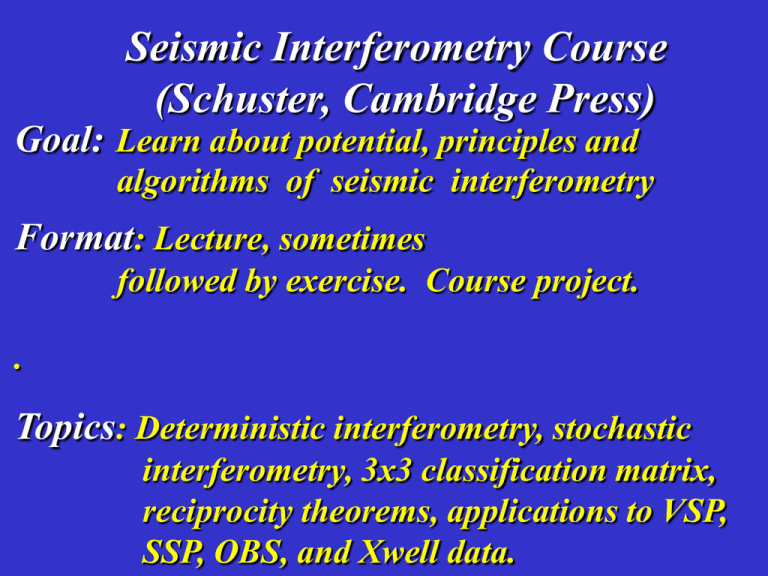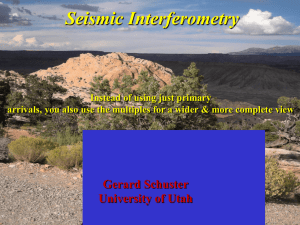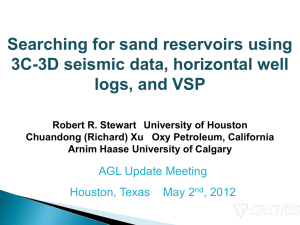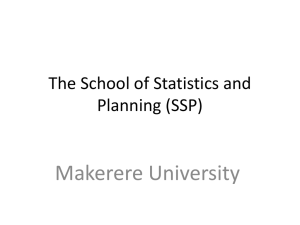PPT overview
advertisement

Seismic Interferometry Course
(Schuster, Cambridge Press)
Goal: Learn about potential, principles and
algorithms of seismic interferometry
Format: Lecture, sometimes
followed by exercise. Course project.
.
Topics: Deterministic interferometry, stochastic
interferometry, 3x3 classification matrix,
reciprocity theorems, applications to VSP,
SSP, OBS, and Xwell data.
Seismic Interferometry: Instead of using just primary
arrivals, you also use the multiples for a wider view
Overview of Seismic Interferometry
and Applications in Exploration
Gerard Schuster
KAUST & University of Utah
Outline
•What is Seismic Interferometry?
•Applications
•VSP->SSP (surface seismic profile)
•VSP->SWP (single well profile)
•SSP->SSP
•Conclusions
SELECTIVE HISTORY SEISMIC INTERFEROMETRY
1968
!
Claerbout V(z)+passive
redatum
1970s Berryhill model-based redatum
1980s Cole+Claerbout V(x,y,z)+passive?
1990s Scherbaum earthquake V(z)+passive
1999
Rickett+Claerbout V(z) Helioseismology
Daylight Imaging, passive
Utah: Stationary Phase Theory, SSP, and VSP
Seismic Interferometric imaging, deterministic
2002-04 Wapenaar Recip. Thm. Correlation Type
Gerstoft + others Surface Wave Interferometry
Snieder Stationary Phase Redatuming
Shell Virtual Sources:Calvert+Bakulin
2001
SELECTIVE HISTORY SEISMIC INTERFEROMETRY
!
redatum
Passive Reservoir
Earthquakes
Shell, Draganov,
Wapenaar, Snieder, Polleto
Miranda, etc
Nowack, Sheng, Curtis etc
Engineering Xwell
Minato, Onishi, Matsuoka etc
Surface waves
Shapiro, Derode, Larose, Dong,
Xue, Halliday, Curtis,
Van Mannen, Robertsson,
Volcanoes+Coda
Snieder, Scales, Gret et al
Gerstoft, Sabra, Kepler, Roux,
He, Ritzwoller, Campillo etc
Model Tank
Scales, Malcolm etc
Interpolation
Sheng, Curry, Berkhout, Wang,
Dong, Hanafy, Cao, etc
VSP
Yu, Calvert, Bakulin, He,
Jiang, Hornby, Xiao, Willis, Lu,
Toksoz, Campman etc
Extrapolation
Dong, Hanafy, Cao, etc
EM
Slob, Wapenaar, Snieder
Theory: Acoustic, EM, Elastic, Potential
Fink, Wapenaar, Snieder, Papanicolaou, Blomgren,
Slob, Thorbeck, van der Neut etc
Refractions
Boise State Univ, Dong
Exploration
Curry, Guitton, Shragg, Yu,
Artman
What is Seismic Interferometry?
Answer: Redatums data by correlation of trace pairs and
stacking the result for different shot positions
iwtxB iw(t xB+ tBz+ tzB)
e
e
s
*
G(B|x) G(B|x)
VSP
Assume a
VSP experiment
z
Phase of Common
Raypath Cancels
x
= e
G(B|B)
=>
B
Point Source Response
with src at B and rec at B
SSP
F.S. multiple
direct
B
=
iw( t Bz+ tzB )
virtual
primary
virtual
source
z
A
No need to know src. location
z•
•No need to know src excitation time
•Redatum source closer to target
What is Seismic Interferometry?
Answer: Redatums data by correlation
correlation of trace pairs and
stacking the result for different shot positions
stacking
iwtxB iw(t xB+ tBz+ tzB)
x
x
x
e
e
G(B|x)* G(B|x)
~
=
~
z
z•
Phase of Common
Raypath Cancels
iw( t Bz+ tzB )
= e
G(B|B)
Point Source Response
with src at B and rec at B
z
A
No need to know src. location
•No need to know src excitation time
•Redatum source closer to target
Reciprocity Correlation Equation
2D Reflection Data
x
k =~
G(x|B)* G(x|A)
~
SSP
VSP
VSP
B
G(A|B)
B
A
A
x
x
A
Old Multiples Become
New Primaries!
•No need to know VSP rec location at x Phase of Common Raypath Cancels
•No need to know receiver statics
Reciprocity Correlation Equation
2D Reflection Data
{G(B|x)*
k =* G(A|B)
2
G(x|B)*
G(x|A)
*
n
G(A|x)
d
x
=
G(A|B)
G(B|A)
}
G(A|x)
G(B|x)
x
(Wapenaar, 2004)
S
well
Finite aperture leads to incomplete G(B|A)
B
B
A
A
x
Problems: Finite source aperture
No attenuation
1-way+ far-field approx.
x
A
Old Multiples Become
New Primaries!
Muting, Least squares or MDD
Atten. Compensation
Prediction Multiple by Convolution (SRME)
*
Prediction Primaries by Crosscorrelation
(Crosscorrelation migration interferometry)
A
B
C
A
B
B
C
VSP Multiple (12 receivers 13 kft @
30 ft spacing; 500 shots)
5000
Depth (ft)
13000
0
X (ft)
56000
TLE, Jiang et al., 2005
Surface Seismic
5000
Depth (ft)
13000
0
X (ft)
56000
TLE, Jiang et al., 2005
VSP Multiple (12 receivers 13 kft @
30 ft spacing; 500 shots)
5000
Depth (ft)
13000
0
X (ft)
56000
TLE, Jiang et al., 2005
Standard VSP vs Interferometric VSP Imaging
Standard VSP Imaging
Interferometric VSP Imaging
Primary reflections
Multiple reflections
Small
vs
Huge Illumination
Instead of using just primary
arrivals, you also use the multiples for a wider/partial vision
stellar interferometry, a team of French astronomers has captured one of the sharpest color images ever made. They observed the star T Leporis
with the European Southern Observatory's Very Large Telescope Interferometer (VLTI; Cerro Paranal, Chile), which emulates a virtual telescope
about 100 meters across, and which revealed a spherical molecular shell around the aged star.
Stellar Interferometry
An astronomical interferometer is an array of telescopes or mirror
segments acting together to probe structures with higher resolution.
3x3 Classification Matrix
out
in
SSP
VSP
SWP
SSP SSP
SSP
SSP
VSP
SSP
SWP
VSP VSP
SSP
VSP
VSP
VSP
SWP
SWP SWP
SSP
SWP
VSP
SWP
SWP
Summary
•Seismic Interferometry:
x
G(x|B)* G(x|A)
~
~
imaginary
Im[G(A|B)]
x
x
A
G(A|x)
B
G(B|x)
k
A
B
G(A|B)
•Merits: Eliminates need for src location, excitation time, some statics.
Moves rec./srcs closer to target , no velocity model needed (unlike
Berryhill).
•Challenges: Finite aperture and noise, attenuation, acoustic & farfield
approximations , amplitude fidelity
•Killer Apps in Earthquake: Surface wave interferometry
•Killer Apps in Exploration: Passive reservoir monitoring? OBS? EM? VSP
Outline
•Background for Non-geo types
•What is Seismic Interferometry?
•Reciprocity Equation Correlation Type
•Classification Matrix
•Applications
•Conclusions
Reciprocity Eqn. of Correlation Type
Free surface
1. Helmholtz Eqns:
2
[
2
[
x
+ k2 ]G(A|x) =- (x-A);
B
P(B|x)
2
+ k ] P(B|x)* =- (x-B)
A
G(A|x)
2. Multiply by G(A|x) and P(B|x)* and subtract
P(B|x)* [
G(A|x) [
P(B|x)*
P(B|x)*
G(A|x)
2
2
+ k2 ]G(A|x) =- (x-A) P(B|x)*
2
+ k ] P(B|x)*=- (x-B) G(A|x)
2
G(A|x) - G(A|x)
2
G(A|x) =
2
P(B|x)*=
2
P(B|x)* =
(B-x)G(A|x) -
{ P(B|x)* G(A|x) } - [
[G(A|x) P(B|x)*] - [
(A-x)P(B|x)*
G(A|x)]
]
G(A|x) P(B|x)*
*
P(B|x)
Reciprocity Eqn. of Correlation Type
Free surface
1. Helmholtz Eqns:
2
[
2
[
x
+ k2 ]G(A|x) =- (x-A);
B
P(B|x)
2
+ k ] P(B|x)* =- (x-B)
A
G(A|x)
2. Multiply by G(A|x) and P(B|x)* and subtract
P(B|x)* [
G(A|x) [
P(B|x)*
2
2
+ k2 ]G(A|x) =- (x-A) P(B|x)*
2
+ k ] P(B|x)*=- (x-B) G(A|x)
2
G(A|x) - G(A|x)
2
2
P(B|x)* =
(B-x)G(A|x) -
(A-x)P(B|x)*
*
* G(A|x)
* G(A|x)
*
=
{
*
}
P(B|x)
P(B|x)
P(B|x)
=
(B-x)G(A|x)
(A-x)P(B|x)
{ P(B|x)
}
* G(A|x)
G(A|x)
G(A|x)
P(B|x)
2
P(B|x)*=
G(A|x)
G(A|x) P(B|x)*
[G(A|x) P(B|x)*] -
Reciprocity Eqn. of Correlation Type
3. Integrate over a volume
{ P(B|x)*
G(A|x) - G(A|x)
3
P(B|x)*} d x = G(A|B) -
P(B|A)*
2
*
n
P(B|x) } d x = G(A|B) -
P(B|A)*
4. Gauss’s Theorem
{
P(B|x)*
G(A|x) - G(A|x)
Source line
G(A|B)
Free surface
x
B
A
Integration at infinity vanishes
Reciprocity Eqn. of Correlation Type
3. Integrate over a volume
{ P(B|x)*
G(A|x) - G(A|x)
3
P(B|x)*} d x = G(A|B) -
P(B|A)*
2
*
}
n
d x = G(A|B) G(B|x)
G(B|A)*
4. Gauss’s Theorem
{ G(B|x)*
G(A|x) - G(A|x)
Source line
Relationship between reciprocal Green’s functions
G(A|B)
Free surface
x
B
A
Integration at infinity vanishes
Reciprocity Eqn. of Correlation Type
{ G(B|x)*
G(A|x) - G(A|x)
Source line
Recall
n
G(A|x )
(1)
2
2i Im[G(A|B)]
- G(B|A)*
G(B|x)*} n d x = =G(A|B)
Neglect 1/r2
iwr/c
iw/c
e
= ikG(A|x )
(2a)
|r|
n r
-iwr/c
n
-iw/c e
*n
-ik
G(B|x
)
G(B|x )* =
|r|
r
(2b)
Plug (2a) and (2b) into (1)
B
2ik
2
*
*X
n
r
d
x = =G(A|B)
G(B|x)
G(A|x)
2i Im[G(A|B)]
G(B|A)
A
Source line
(3)
Far-Field Reciprocity Eqn. of Correlation Type
^n
G(B|x)*
k
2
G(A|x) n r d x = =G(A|B)
2i Im[G(A|B)]
- G(B|A)*
r^
(3)
Source line
n r ~ 1
k
G(B|x)*
A
2
n
r
d x = =G(A|B)
G(A|x)
2i Im[G(A|B)]
- G(B|A)*
Source line
G(A|B)
Free surface
x
B
A
(4)
Far-Field Reciprocity Eqn. of Correlation Type
G(B|x)*
k
2
G(A|x) n r d x = =G(A|B)
2i Im[G(A|B)]
- G(B|A)*
(3)
Source line
n r ~ 1
k
G(B|x)*
2
n
r
d x = =G(A|B)
G(A|x)
2i Im[G(A|B)]
- G(B|A)*
Source line
G(A|B)
Free surface
x
B
A
(4)
Far-Field Reciprocity Eqn. of Correlation Type
k
G(B|x)*
2
G(A|x) n r d x = =G(A|B)
2i Im[G(A|B)]
- G(B|A)*
(4)
Source line
Source redatumed from x to B
x
B
x
A
B
x
A
B
A
Virtual source
G(B|x)*
G(A|x)
G(A|B)
Outline
•What is Seismic Interferometry?
•Applications
•VSP->SSP (surface seismic profile)
•VSP->SWP (single well profile)
•SSP->SSP
•Conclusions
Implementation
VSP
k
x
VSP
SSP
G(A|x)* G(B|x) =
Im[G(A|B)]
1. FK Filter up and downgoing waves
2. Correlation: f(A,B,x) = G(A|x)* G(B|x)
3. Summation: k
f(A,B,x) =
Im[G(A|B)]
x
4. Migration: M(x) = Mig(G(A|B))
A B
A B
x
A B
x
Challenge: Finite Receiver Aperture = Partial Reconstruction
x
3D SEG Salt Model Test
(He, 2006)
VSP Multiples Migration
Stack of 6 receiver gathers
( Courtesy of P/GSI: ~¼ million traces, ~3 GB memory, ~4 hours on a PC )
(He, 2006)
Marine 3D VSP Field Data
Application
BP 3D VSP Survey Geometry (36 recs)
~ 11 km
1.6 km
4.0 km
3 km
(He et al., 2007)
VSP->SSP Summary
VSP
k
VSP
SSP
!
x
G(A|x)* G(B|x) =
A B
Im[G(A|B)]
A B
x
A B
x
x
Key Point #1: Every Bounce Pt on Surface Acts a New Virtual Source
Key Point #2: Kills Receiver Statics
Key Point #3: Redatuming = Huge Increase Illumination area
Key Point #4: Liabilities: Finite Aperture noise, attenuation, loss amplitudes fidelity
Outline
•What is Seismic Interferometry?
•Applications
•VSP->SSP (surface seismic profile)
•VSP->SWP (single well profile)
•SSP->SSP
•Conclusions
Motivation
Problem: Overburden+statics defocus VSP migration
Solution: VSP -> SWP Transform (Calvert, Bakulin)
VSP
VSP
SWP
Redatum sources below overburden
Local VSP migration
VSP Geometry
1500
Reflection
wavefield
Depth
(m)
0
3500
0
Offset (m)
Time (s)
1000
(He , 2006)
3
VSP Geometry
1500
Reflection
wavefield
Depth
(m)
superresolution
0
3500
0
China
Offset (m)
Time (s)
1000
(He , 2006)
3
VSP Salt Flank Imaging
(Hornby & Yu, 2006)
120 shots
Overburden
?
98 geophones
Poor image of flank by standard migration
Interferometric Migration
Result
0
2000 ft
VSP->SWP Summary
!
1. Redatum sources below overburden
2. Local VSP migration
3. Kills Source Statics and no need to know src location or excitation time
4. Super-resolution
5. Instead of redatuming receivers to surface, we
redatum sources to depth.
Outline
•What is Seismic Interferometry?
•Applications
•VSP->SSP (surface seismic profile)
•VSP->SWP (single well profile)
•SSP->SSP
•Conclusions
Surface Wave Interferometry
G(A|x)*
G(B|x)
G(B|A)
x
x
A
BB
Surface Wave Interferometry
G(A|x)* G(B|x)
= G(B|A)
x
A
B
Surface Wave Interferometry
S-velocity distribution, surface wave predic.+elimination
x
G(A|x)* G(B|x)
= G(B|A)
x
A
B
Shear velocity
Yao (2009)
3x3 Classification Matrix
out
in
SSP
VSP
SWP
SSP SSP
SSP
SSP
VSP
SSP
SWP
VSP VSP
SSP
VSP
VSP
VSP
SWP
SWP SWP
SSP
SWP
VSP
SWP
SWP
Summary
•Seismic Interferometry:
x
G(x|B)* G(x|A)
~
~
Im[G(A|B)]
x
x
A
G(A|x)
B
G(B|x)
k
A
B
G(A|B)
•Merits: Eliminates need for src location, excitation time, some statics.
Moves rec./srcs closer to target , no velocity model needed (unlike
Berryhill).
•Challenges: Finite aperture and noise, attenuation, acoustic & farfield
approximations , amplitude fidelity
•Killer Apps in Earthquake: Surface wave interferometry
•Killer Apps in Exploration: Passive reservoir monitoring? OBS? EM? VSP
Thanks
•UTAM sponsors
•Min Zhou, Chaiwoot Boonyasiriwat, Ge Zhan
Outline
•Background for Non-geo types
•What is Seismic Interferometry?
•Reciprocity Equation Correlation Type
•Classification Matrix
•Applications
•Conclusions
Saudi Land Survey
overburden
sandstone
sandstone
shale
shale
Saudi Land Survey
multiple
primary
Saudi Land Survey
SSP=Surface Seismic
Survey
1.5
2
)s( emiT
2
1.5
Marine SSP Survey
1
1Seismic
SSP=Surface
Survey
0.5
0.5
0
0
b) Original CSG 1
12.5 m
a) Virtua
Vertical Seismic Profile Survey
5.2
1 GS C lautr iV )a
2
5.1
)mk( tesffO
1
0
5.0
1
3
5.2
2
5.1
Time (s)
1 GS C lan ig irO
5.2
2
5.
)mk( tesffO
Survey Goal:
Goal: Get
Get m
d from
Geologist
from dd
Offset (km)
1.5
2
2.5
3
2.5
2.5
2
2
)s( emiT
d(g,t)
)s( emiT
3
1
1.5
t
2.5
1.5
1
1
0.5
0.5
0
Offset (km)
1.5
2
1
0
b) Original CSG 1
a) Virtual CSG 1
g
Model based
Lm=d
T
-1
T
T
m = [L L] L d ~ L d
Data based
m(x,z)
Far-Field Reciprocity Eqn. of Correlation Type
k
G(B|x)*
2
G(A|x) n r d x = =G(A|B)
2i Im[G(A|B)]
- G(B|A)*
(4)
Source line
Source redatumed from x to B
x
B
x
A
G(B|x)*
B
x
A
B
G(A|x)
A
G(A|B)
Recovering the Green’s function
Outline
•Background for Non-geo types
•What is Seismic Interferometry?
•Reciprocity Equation Correlation Type
•Classification Matrix
•Applications
•Conclusions







